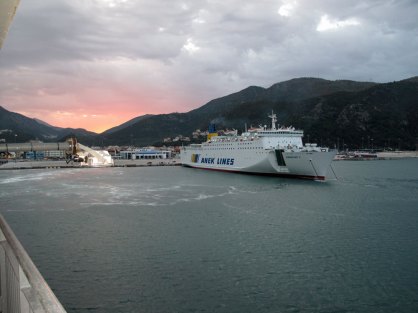
L’amour, la folie
Order of the day, from Bonaparte, First Counsul, to his guard:
“Greadier Gobain has committed suicide for love: moreover he was a very fine soldier. This is the second event of this kind which has occurred within the corps in a month. The First Counsul orders the guard to be notified: that a soldier must conquer the pain and melancholy of the passions; that there is as much true courage in suffering steadfastly the pangs of the soul as in standing fast under the fire of a battery…”.
(Quoted in “Roland Barthes, by Roland Barthes”.)

Memory and Dusk
A poem by George Sarantaris
They come by slowly
In the garden that accepted us
And was our hideout for life
The hours the women the pigeons…

The Arrows
A poem by Andreas Empeirikos
A girl in a garden
Two women in a tub
Three girls in my heart
Without limits without conditions…

“When I was kissing her, I believed I was taking her soul from her lips, and I was offering her the whole of my soul. It was the sky, the universe.”
(Gamiani, Alfred de Musset)

“- Why are you slipping away from my hands? Where are you? I have new tatoos to show you. Do not wake up… Exactly the way you are, I will put your figure on the stern… Little girl. Take my hand and show me the world.
– I do not have a hand. There is no world.”
Nikos Kavadias, The Watch

“What was making me furious was the fact that although I did not love Cecilia, the circumstances were forcing me to have the feelings and the behaviour becoming to a person in love. I wanted to liberate myself from these instances like an animal wanting to take the noose off its neck…”
Alberto Moravia, Boredom

Don’t wish too hard, or you will get what you want.
Jewish proverb

Desires
A poem by Constantine Cavafy
Like beautiful bodies of the dead, who had not grown old
and they shut them with tears, in a magnificent mausoleum,
with roses at the head and jasmine at the feet —
that is how desires look that have passed
without fultillment; without one of them having achieved
a night of sensual delight, or a moonlit morn.

I lost everything
A poem of Giuseppe Ungaretti
…
I remember how I used to tremble for you,
And look at me now I am lost
In the night’s infinity
…

“Hanold had chosen archaeology as a retreat from love. But it was an archaeological object, the sculpture of Gradiva, that aroused his desire. Thus his repressed sexuality used the very instrument of its repression (archaeology) to gain access to consciousness. The symptom of his disorder, the delusion that the sculpture was a real woman, was a compromise formed between the sexual drive and the repression.”
Freud Museum
Gradiva: The Cure Through Love, An exhibition on Freud as archaeological literary critic

ISOLDE
Do I alone
hear this melody
which, so wondrous
and tender
in its blissful lament,
all‑revealing,
gently pardoning,
sounding from him,
pierces me through,
rises above,
blessedly echoing
and ringing round me?
Resounding yet more clearly,
wafting about me,
are they waves
of refreshing breezes?
(continued…)

Are they clouds
of heavenly fragrance?
As they swell
and roar round me,
shall I breathe them,
shall I listen to them?
Shall I sip them,
plunge beneath them,
to expire in sweet perfume?
In the surging swell,
in the ringing sound,
in the vast wave
of the world’s breath –
to drown,
to sink
unconscious –
supreme bliss!
Isolde’s Death Song, Tristan and Isolde











